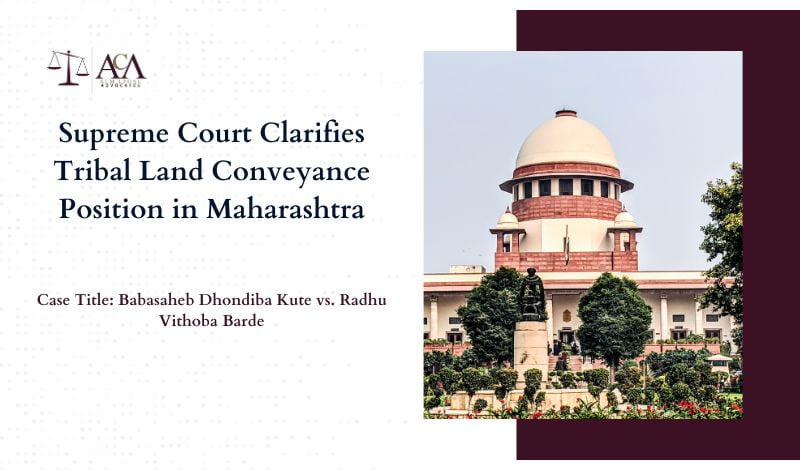In a significant verdict, the Supreme Court of India delivered a nuanced interpretation of property law, particularly in the context of land transactions involving tribal sellers in Maharashtra. The Hon’ble court’s judgement sheds light on the conditions under which tribals can enter into agreements to sell their land and the subsequent legal requirements for such transactions.
Case Background
The case titled “Babasaheb Dhondiba Kute vs. Radhu Vithoba Barde” reached the Supreme Court following appeals against decisions made by lower courts. The origins of the dispute trace back to an agreement to sell land, signed between the parties on July 31, 2001. According to the agreement, the defendant (a tribal landowner) agreed to sell land to the plaintiff for Rs. 225,000, of which Rs. 220,000 had already been paid.
However, the seller failed to execute the sale deed, prompting the buyer to seek legal recourse for specific performance – a legal mechanism that compels the completion of a contract. The trial court, followed by the appellate courts, denied specific performance but allowed for the refund of the advance payment with interest.
Central to the dispute was the interpretation of Section 36A of the Maharashtra Land Revenue Code, concerning the transfer of tribal lands to non-tribals, and Section 17 of the Registration Act, 1908, which mandates the registration of certain documents including land sale deeds.
Legal Scrutiny
The Intersection of Tribal Rights and Property Law
The legal conundrum centered around Section 36A of the Maharashtra Land Revenue Code, which imposes restrictions on the transfer of tribal lands to non-tribals without prior government sanction. The pivotal question was, “Whether a tribal landowner could enter into an agreement to sell land to a non-tribal without such sanction?“
The Division Bench of Justices BV Nagarathna and Augustine George Masih meticulously examined the legislative intent and legal precedents. They noted that the conveyance of tribal land to a non-tribal requires prior sanction only at the time of actual sale deed registration. Thus, “the act of entering into a sale agreement and receiving an advance payment does not, in itself, contravene the law.“
Supreme Court’s Decision
The Supreme Court overturned the lower courts’ decisions, asserting that “there should be no barrier to granting a decree for specific performance when no legal grounds exist to deny it.” The bench emphasized that the real conveyance occurs only with the registration of the sale deed, prior to which the parties are merely in an agreement phase.
The Supreme Court also drew parallels to the precedent set in “Nathulal v. Fulchand, 1969(3) SCC 120” where it was established that if an agreement to sell land cannot be specifically performed without the sanction or permission of a relevant authority, the suit can still proceed and a decree for specific performance can be granted, contingent upon obtaining such sanction. This principle underlines the notion that legal procedures, such as those required by Section 36A of the Maharashtra Land Revenue Code and Section 17 of the Registration Act, 1908, must be adhered to but do not inherently prohibit the initiation of agreements to sell tribal land to non-tribals.
The judgement underscored the importance of satisfying legal obligations such as obtaining necessary sanctions under the Maharashtra Land Revenue Code before the actual land transfer. The court clarified that while tribal landowners are not barred from entering agreements to sell, “the definitive transfer of land is contingent upon fulfilling statutory requirements.”
Legal Implications and Broader Impact
This landmark judgement elucidates critical aspects of tribal land transactions in Maharashtra, providing clarity on the procedural and legal safeguards designed to protect tribal interests while also respecting the contractual freedoms of the parties involved. The decision balances the need for tribal protection with the principles of contractual law, ensuring that tribal landowners can engage in land transactions within a legal framework that safeguards their rights.
By affirming the need for specific performance while emphasizing the necessity of prior sanctions, the Supreme Court has provided a clear legal pathway for the transfer of tribal lands to non-tribals, thereby setting a precedent that reconciles tribal protections with the realities of property transactions.
Conclusion
The case of Babasaheb vs. Radhu Vithoba Barde is a testament to the complexities inherent in land laws, especially concerning tribal rights. The Supreme Court’s judgement not only resolves a longstanding dispute but also sets a legal standard for future transactions involving tribal lands in Maharashtra. This ruling is poised to influence how land transactions are conducted, ensuring they are fair, transparent, and within the bounds of law, thereby protecting the interests of some of the most vulnerable members of society.






